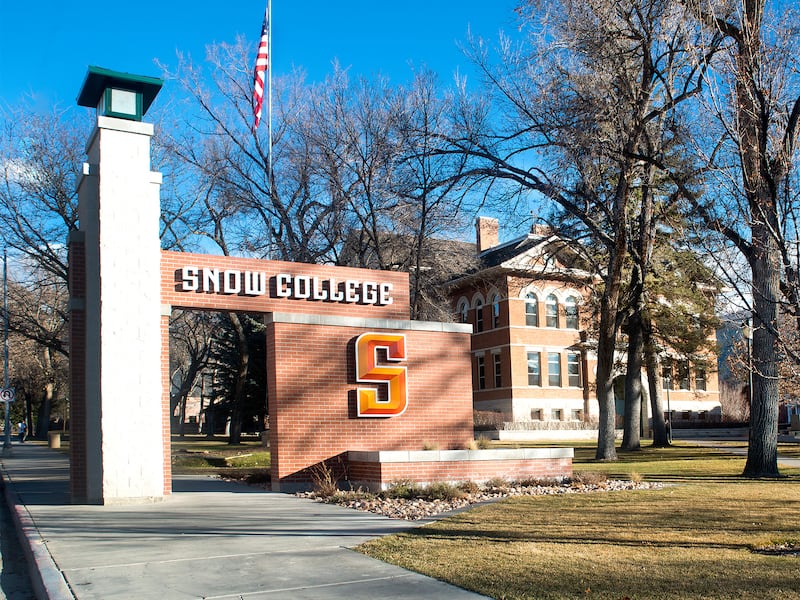For once, a small town being behind the times might not be such a bad thing.
Ephraim, a city of 5,000 residents nestled in Utah’s Sanpete Valley, has yet to report any positive COVID-19 cases. Zero. Neither have neighboring communities Manti, Sterling or a handful of other central Utah towns. It’s not a lack of testing that’s led to the dearth of cases — people are getting tested, Mayor John Scott assures me. Just none have tested positive.
This feat, although impressive, isn’t necessarily unique. A number of other rural towns can boast the same. But what gives me a tinge of pride for the town I once called home is the way its residents have reacted to a global crisis that they’ve yet to experience firsthand.
All state-mandated measures for business operations, churches and schools have been followed, even to extremes — although the county moved to “yellow” last week, most restaurants are still only offering takeout. It’s easier that way, and the community is being supportive. Yesterday, Snow College (the town’s flagship institution) followed suit, becoming Utah’s first college or university to publicly announce tentative plans for this fall — plans which, I might add, take caution and carefulness to the extreme.
While protests demand for businesses to reopen in some of our country’s and our state’s hardest-hit areas, it’s refreshing to see a community give full-fledged support to caution, even though the town still has more stop lights (one) than confirmed COVID-19 cases. Nonetheless, some three months removed from the scheduled return of fall semester, college administrators and city officials have a very grim — and real — possibility to confront: every ounce of precaution now might be undone with missteps in the fall.
Snow has a yearly enrollment of some 5,000 students, the vast majority coming from in-state. Of its total student population, one in four are from Salt Lake and Utah counties — the state’s highest-populated counties, and in turn, its head-and-shoulders leaders in COVID-19 cases.
Coupled with Sanpete County’s demographics — some 14% of its residents are 65 years or older, in comparison to 11% in Salt Lake County and under 8% in Utah County — the introduction of COVID-19 could become very serious, very quickly. In Utah, the virus has hit the elderly population the hardest, a trend matching national and global data — here, over 70% of our 90 fatalities have been 65 or older.
At the onset of the pandemic, Ephraim city leaders grappled with the models state officials provided. By its calculations, if 40% of the city became infected, and with a 4% mortality rate, between 96 and 112 residents would die. For some perspective, that’s about 2,000 deaths per 100,000 people — two times Utah’s highest current rate in San Juan County, and eight times that of New York City. In a small, tight knit community like Ephraim, that was unthinkable.
“Since then, we realize that many of those models have been skewed quite a bit,” Mayor Scott explained. “But that would be devastating in this little community. That is what we had to consider. That was stark, and a little frightening.”
Regardless of the precautionary measures taken by its citizens, though, Ephraim’s COVID-19 fate may be largely out of its hands. With the college empty, the Manti Temple closed, Manti’s Mormon Miracle Pageant permanently canceled and Ephraim’s Scandinavian Days Festival paused, intercounty travel, at least for this summer, will be reduced drastically. But once school resumes in the fall, students will be back, and many will be coming from these highly affected areas.
Snow College President Brad Cook and his colleagues have plans in place to safeguard students and community members alike — especially those at high-risk, like older professors, who might teach from home. But the realization is clear: because of its location, Snow is facing far different scenarios than many other in-state schools.
“Would we be able to pivot differently than, say, an urban school?” Cook asked. “We are in a different situation.”
Cook and the school aren’t taking things lightly. Academic advisers and other college employees have been tasked with calling every single student who they expect to enroll come fall, ensuring that they’re aware of financial resources and gauging their sentiment toward on-campus versus remote learning. They recognize, as does Dr. Anthony Fauci and our nation’s other health leaders, that a vaccine probably won’t be available by fall. But if bulk testing is an option — and Cook and his team join Fauci in expecting that it will be — it will become imperative that every student is tested before starting classes.
“The message we feel is really important to potential students is that we’re ready. Snow College is ready.” — President Brad Cook
Part-time college employees will be tasked over the summer with making masks, perhaps emblazoned with Badger logos or other Snow symbols. Come fall, masks will be encouraged, social distancing will be enforced and — with the possibility of a fall semester spike in cases and a move to remote learning — housing contracts will be flexible.
“The message we feel is really important to potential students is that we’re ready,” Cook repeatedly emphasized. “Snow College is ready.”
So, while protests continue throughout the country calling for reopening, Ephraim has shown us that preparation comes first.
Maybe we can all find a little more Ephraim inside each of us.
Email: sbenson@deseretnews.com.


